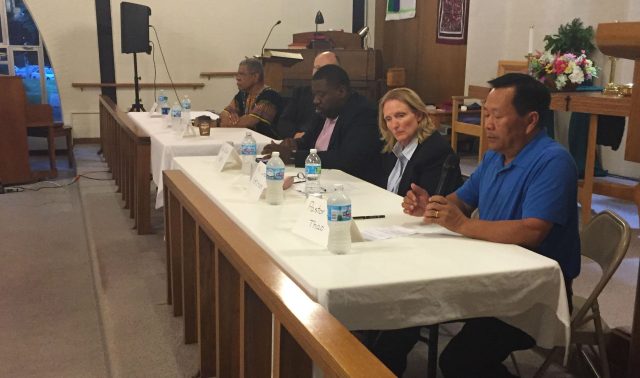On Thursday, Aug. 21, residents of Madison’s north side gathered at Sherman Avenue Methodist Church as a panel of local Christian leaders discussed how the faith community can respond to the recent violence in the city.
Panelists included longtime civil rights activist Rev. Joseph Barring of St. Paul AME Church, former Madison chief of police Rev. David Couper, now rector of St. Peter’s Episcopal Church, Madison Urban Ministry Executive Director Linda Ketcham and Rev. David Hart and Pastor Luke Thao, both of Sherman Avenue United Methodist Church. The panel was moderated by Madison365 Publisher and CEO Henry Sanders.
As the city fears it will reach a record number of homicides this year, the panel discussed potential causes and implications of recent violence. At least three of the 10 homicides this year have taken place on the north side, including 24-year-old Ciara Philumalee, whose mother was present for the discussion.
“We see a Jesus who spoke truth to power,” said Hart during the discussion. “When he saw marginalization, when he saw oppression or unfairness in his culture and society he certainly spoke out to it, he stood up to it, and he resisted it. That is what we’re here to talk about and what we as a faith community should be doing.”
Many of the panelists cited underlying systemic issues and disparities, such as education and health inequities and racism, as root causes for violence.
“Every place I’ve been it’s been the same thing. Any situation where people find themselves in a hopeless or helpless situation, it spurs violence,” said Barring. “When people are in a position where they can’t help themselves or can’t see themselves being helped, it spurs violence and action.”
 “I’ve come to see many of things that we talk about as issues that create violence as actual forms of violence themselves,” added Ketcham. “I believe that poverty is a form of violence, I believe that pay inequity is a form of violence, and I believe that every time our elected officials choose not to invest in human beings and provide resources needed to alleviate struggling they are perpetuating a form of violence.
“I’ve come to see many of things that we talk about as issues that create violence as actual forms of violence themselves,” added Ketcham. “I believe that poverty is a form of violence, I believe that pay inequity is a form of violence, and I believe that every time our elected officials choose not to invest in human beings and provide resources needed to alleviate struggling they are perpetuating a form of violence.
Panelists also touched on the roles of forgiveness and restorative justice in violence discourse, citing that many of the recent homicides were in retaliation to other violent acts.
“Forgiveness is extraordinarily important, but it isn’t the only consideration.” Hart said.
There are other things we have to take into consideration as well. It’s tempering mercy and compassion with a just outcome as well.”
Ketcham made a point to point out who exactly was often expected to forgive and who was expected to be forgiven.
“I work with a lot of people who identify as Christian, yet I don’t always see the forgiveness,” she said. “I don’t see the forgiveness in policies at the state level that continue to discriminate against people who have conviction history or rental laws that says you can refuse to rent to someone who has been arrested. I think we don’t forgive enough and I think part of the reason the men and women we serve commit violent acts is because they aren’t forgiven and people get desperate when they can’t put the pieces of their life back together.”
When it came to actionable solutions that church communities can take to address violence panelists suggestions ranged from more diverse congregations to going outside of church walls and into the community.
“Sunday at 11 am is the most segregated time in American,” said Couper. “God’s vision is for oneness not to be separate.”
“As a body of believers we can organize a mentor network where we develop an intervention and prevention model,” said Hart. “We can’t just sit here in this church, we’re not going to end violence in here. This is good to get it started but we have to develop a network of people.”
Hart also believed that the power of prayer could go a long way.
“As a faith community we must pray. We must pray together and we have to pray as Christians for the safety of this community and this world and not for any one particular thing, but for a protective hedge around our community,” Hart said. “It brings me to tears that I have to talk to a woman I’ve known for 25 years to try and encourage her because she has just lost her daughter to violence.”
Ultimately panelists and community members alike agreed that thwarting local violence would take multiple entities in the community coming together for a common goal.
“Every time there’s conflict in the Bible there is a lost of relationship and God has called us to be in relationship with one another and to love others,” said Hart. “Many of the things we talked about tonight could be alleviated if we are in good relationship with each other.”




























